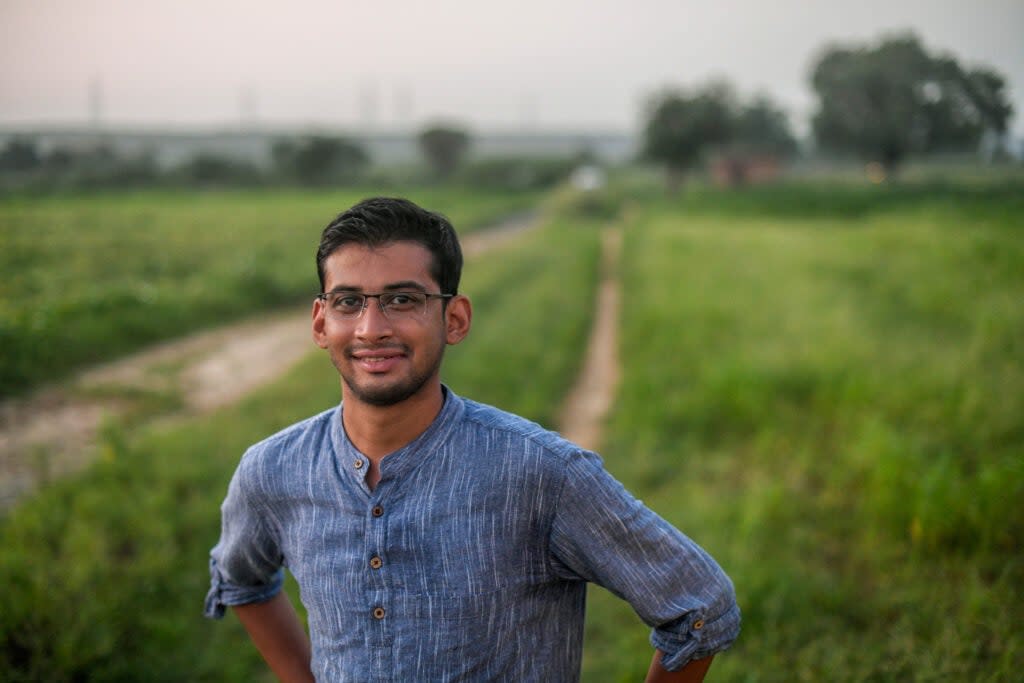Earthshot prize winner recognised for innovative effort to tackle northern India’s smog crisis

Satellite images of northern India in the past week have revealed a hellish phenomenon oddly specific to the country during winter months.
The grey haze engulfing the region’s otherwise green agricultural land marks the start of a yearly struggle against air pollution that can begin from September and stretches well into the winter, as rice-growing farmers are compelled to burn agricultural waste to make space for their next batch of crops.
This is one of the major factors making India’s national capital Delhi — surrounded by farming-intensive states — a fixture on lists of the world’s most polluted cities.
Its a mammoth challenge to fix, but one that Kevin Kung and Vidyut Mohan have taken on regardless. Their bio-tech solution to tackle the phenomenon has been awarded the 2021 Earthshot Prize and given £1m by Britain’s Prince William and the Duchess of Cambridge on Sunday.
WINNER: @BiomassTakachar, #EarthshotPrize Winner to #CleanOurAir!#EarthshotLondon2021 🌎 pic.twitter.com/c0Zy8Yoozx
— #EarthshotLondon2021 Awards (@EarthshotPrize) October 17, 2021
Their solution holds both the tantalising promise of cleaning up Delhi’s deadly smog and also battling the climate crisis at the same time.
Mr Mohan and Mr Kung are the co-founders of Takachar, a mission that aims to convert crop residue into valuable products for the consumer market.
1) We are so honoured to be a part of this stellar team of the first-ever @EarthshotPrize finalists.
Together, we are committed to helping repair our planet and inspiring hope for the future.— Takachar (@BiomassTakachar) October 15, 2021
Both of them have spent the better part of the last three years running multiple pilot projects across India, Kenya and the US to find out how they can better tackle the disposal of $120bn (£87.4bn) worth of crop residue that they say is burned across the world every year.
A prototype of their technology will be on ground in the next 45 days in the city of Rohtak in Haryana, a top farming state in northern India. They say this tech can reduce smoke emissions by up to 98 per cent.
“If scaled, it could cut a billion tonnes of carbon dioxide a year: a win for India’s farmers will be a win in the fight against climate change,” says a statement by the founders carried by the Earthshot Prize website.
With assistance from the World Food Programme, their pilot project will go on for a year and make better use of rice straws, repurposing them as fuel and fertilisers, instead of watching them burn away in the open and pollute surrounding cities and states.
😱 The moment our first #EarthshotPrize Winners found out they had won! 🏆#EarthshotLondon2021 🌎 pic.twitter.com/uKdiy9JNP0
— #EarthshotLondon2021 Awards (@EarthshotPrize) October 18, 2021
Speaking to The Independent, Mr Mohan explained that their technology works by roasting waste like rice straw in controlled amounts of air, cooking away undesirable elements like moisture and leaving behind a dense bio-fuel.
“It takes out the low energy containing molecules and leaves behind carbon-dense molecules, which goes on to become a base for making various products like fuel and fertilisers,” Mr Mohan says. The process is called torrefaction, and it’s also used to roast coffee beans to make them ready for consumption.
The project’s founders say the method is finding acceptance in Indian states across the country, even beyond the smog-hit northern region.
“I get calls from farmers in Tamil Nadu and Rajasthan who are eager and asking when our technology will enter the Indian market,” Mr Mohan says, adding that their project is going to benefit farmers anywhere where there is a system of crop rotation currently involving the torching of residue.
“We want to make it very easy for farmers to get rid of their waste,” Mr Mohan says.
If Takachar can be rolled out successfully, then it has the potential to pay off not just for farmers, but for everyone affected by the crisis of air pollution in India.
From a public health standpoint, the numbers are really shocking, Mr Mohan says.
“A recent study showed that air pollution in northern India affects nearly 480 million — 40 per cent of the population — severely and reduces life-expectancy by nine years. It is a staggering number to look at,” he says.
A study by the Energy Policy Institute at the University of Chicago (EPIC), cited by Mr Mohan, shows northern India breathes “pollution levels that are 10 times worse than those found anywhere else in the world”.
“It is not just rice straws as agricultural waste, but also sugarcane trash, pine needles and cotton stocks. The agricultural waste is said to contribute 30 per cent of this total smog: a significant proportion,” he points out.
Mr Mohan and Mr Kung ultimately want Takachar to have a net-positive effect.
“Ultimately, beyond the numbers and impact, what matters is when I go to the farmers and I am able to strike the emotional connect to offer a solution,” adds Mr Mohan.
Read More
Population decline good news for climate, says former finance chief

